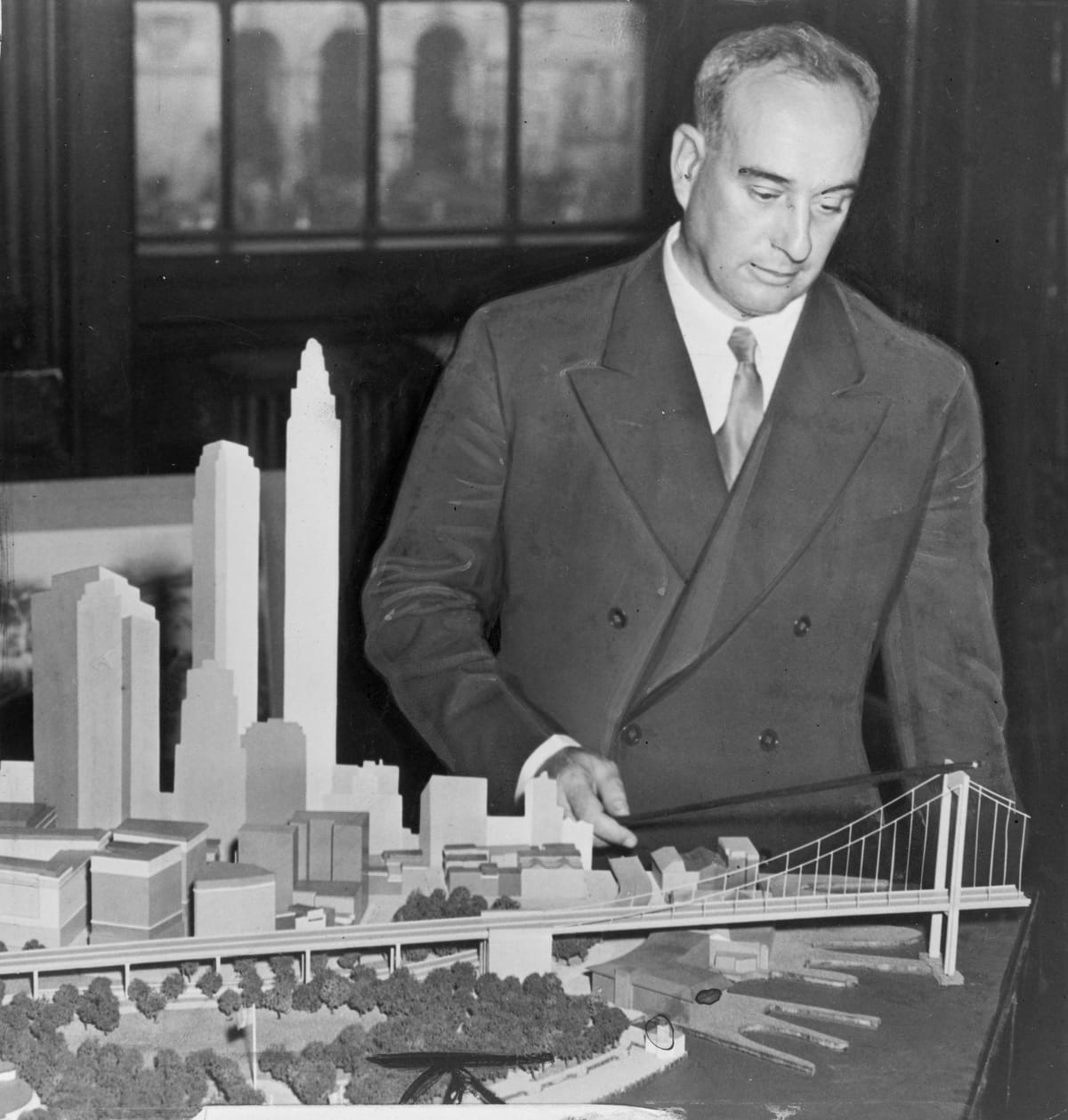Corruption: How Robert Moses Turned from Idealist to 'Power Broker'

I think it is usually better to focus on positive things, on how good things could be, instead of how bad they are or how bad they may turn out. But, notwithstanding this preference, I also think it is necessary to discuss a few key properties of nature and human nature, which are of potential great detriment to our common good.
One such property is the tendency of any social system to develop corrupt elements. If we think of corruption, the first thing we tend to think about is money. A politician getting paid to cast a certain vote; a policeman getting paid for looking the other way. But money is only a vehicle - a very important one in our current world, but a vehicle nonetheless. What corruption is really about is power. It is the use of power for the increase of power of one individual or a select, small group of individuals rather than using power to foster the common good.
I am currently reading the book The Power Broker by Robert Caro. It is a biography of Robert Moses who shaped New York with the construction of parks, roads and bridges. Robert Moses famously did not abuse his power to make himself a rich man. But corrupt he was nonetheless. He built a network of political influence which enabled him to realise public work projects in alignment with his vision about how the city and state of New York should be. The resulting concentration of power lead to many voices not being heard when it was decided where bridges, tunnels, parks and roads should be build. This undermines the core of democracy; which is all about the messy process to find the solution which provides the best compromise for all parties affected by a decision.
However, there is another, interesting side to the story of Robert Moses, and that is how he got where he ended up. Robert Moses started his career in public service as a dedicated idealist; who would not compromise his honour or his dedication to public service to any outside influence. His resistance to follow the 'way things were' came with great personal costs to him. Later in his life, he learned the trade of how power needs to be orchestrated to 'get things done'. He failed at being an idealist; he excelled at being a master manipulator. What resulted was a twisted creature; crushed between his desire to realise public work projects for the public good, and the necessities of political realities.
I think this teaches a very important lesson about corruption. Corruption prospers in a corrupt environment. If Robert Moses would have entered public service in a different city, a different country, where public discourse and rational considerations have a stronger influence on the actions of government, he might have been enabled to put his genius to work for the public good. He might have learned to listen to the voices of the disadvantaged but plenty rather than the voices of the powerful but few.
Now what is one to do when confronted with a corrupt environment, an environment where power feeds upon itself rather than being shared for public good? This is a question for which I am thus far not able to provide a reasonable answer to. Robert Moses chose to adapt to the system, work within its rules to realise his dreams. In the process, he lost sight of what these dreams initially were; in result, he sowed more bad than good.
Michael Gorbachev, the last leader of the USSR, was confronted with a similar problem than Robert Moses. He started an idealist but was faced with an extremely corrupt economical and political system. However, in contrast to Moses, Gorbachev never lost sight of his ideals; of his desire to bring goodness to the people rather than himself. In the end, I think he brought more good into the world than bad - though plenty of Russian nationalist won't share this sentiment, of course.
Interestingly, both Gorbachev and Moses were considered to be part of the 'reformers' within a corrupt system at the beginning of their careers. In the USSR, more and more politicians came to realise that things just could not go on as they used to; they were ready to accept change. Likewise in New York, there was an influential group of public spirited individuals who were very passionate about rooting out corruption in the city government. Neither Gorbachev nor Moses had to walk their way alone. But both betrayed their supporters: Gorbachev by being more liberal and innovative than he ought to be and Moses by betraying the ideals everyone thought he stood for.
I think it takes a truly exceptional individual to play by the rules of a system in order to change the system from the inside. Social systems exists because they manage to induce certain ways of thinking into a group of individuals; you might just be one of them. Thus, I think it is generally best to try to stay away from those systems which are corrupt. Only if you are certain you have an exceptionally strong mind and clear sight of your goals, should you attempt to change a system from within. Otherwise, keep yourself pure and stick to your ideals in every action; try to find those which are of one mind with you; there will always be plenty.





